Vaccine against covid-19: the strategy of the country that decided to vaccinate young people before the elderly
Younger workers are seen as the key to tackling the virus crisis
Indonesia launched a free mass vaccination program against covid-19 in an attempt to prevent the virus from spreading and to revive its economy.
But the country is taking a different approach from the rest. Instead of vaccinating the elderly in the first phase, after frontline workers, it will target younger workers aged 18 to 59.
Indonesia will use CoronaVac, the same that the Butantan Institute will supply to part of the Brazilian population. In Brazil, however, the Ministry of Health will prioritize health workers and the elderly.
President Joko Widodo, 59, was the first person in the country to receive the vaccine on Wednesday. Vice President Ma'ruf Amin, 77, will not receive the vaccine yet because he is outside the priority group.
Professor Amin Soebandrio, who sits on a council that advised the government on its "youth first" strategy, argues that it makes sense to prioritize immunizing workers - those "who leave home and spread all over the place and then at night they come home to their families ".
"Our target is those who are likely to spread the virus," he told BBC Indonesia, the BBC's news service for the country.
He argues that such an approach will give the country the best chance of obtaining herd immunity, something that occurs when a large part of a community becomes immune through vaccinations or the mass spread of a disease.
President Joko Widodo took the first injection of the vaccine
It was believed that 60-70% of the global population would need to be immune to prevent the coronavirus from spreading easily. However, these numbers will increase considerably if the new, more communicable variants spread widely.
"This is the long-term goal - or at least we will significantly reduce the spread of the virus so that the pandemic is brought under control and we can get the economy going again," said Professor Soebandrio.
Indonesia, with a population of 270 million, has the highest cumulative number of covid-19 cases in Southeast Asia. According to government data, about 80% of cases are of the working population.
Although schools and government offices have been closed for almost a year, the government has resisted putting in place strict restrictions, fearing the impact on the country's economy. More than half the population works in the informal sector, so for many, working from home is not an option.
The country's Health Minister, Budi Gunadi Sadikin, defended the strategy and insists that it is not just about the economy, but "protecting people and targeting those who are likely to catch and spread it first".
"We are focusing on people who have to meet a lot of people as part of their job; motorcycle taxi, police, military. So I don't want people to think that this is just about the economy. It is about protecting people." he said.
What about the elderly?
The government argues that it will also offer protection to the elderly.
"Immunizing members who work in a family means that they are not bringing the virus into the home, where their older relatives are," said Siti Nadia Tarmizi, spokeswoman for the Ministry of Health for the vaccination program against covid- 19.
Most elderly people in Indonesia live in homes with people of another generation, and isolating them from the rest of the family is often impossible.
"Therefore, it is an additional benefit of this approach, which when vaccinating people aged 18 to 59 years also offers some protection to the elderly with whom they live," she said.
Indonesia has recorded more than 600,000 cases of covid-19 since the start of the pandemic
However, there is a problem: it is not known whether the vaccine prevents the spread of the virus or if it only prevents the development of severe symptoms.
"We just don't have that information yet," said Professor Robert Read, an expert who advises UK health departments on immunization.
"The reason why the UK has not immunized the younger population before is that, first, the youngest do not contract such a serious disease and, second, we have not yet been able to demonstrate that vaccines have any impact on transmission", he said.
Indonesia's approach, he said, would need very high vaccine uptake - "at least 50% in all likelihood, to prevent death and hospitalization in its older population".
"It is possible that, if they get very high coverage rates, there will be some impact on the transmission, although we obviously haven't seen that yet."
What tests did Indonesia conduct?
Indonesia has taken its unique approach in part because the main vaccine it is using has not been tested in the elderly.
Indonesia has a huge young population, but spends comparatively little on health
The country is heavily dependent on the CoronaVac made by Chinese Sinovac to inoculate its population, with 3 million of the 125 million promised doses already delivered and being distributed to health facilities across the country.
The government only conducted tests in the 18 to 59 age group as part of the multi-country Sinovac study.
"Each country could be tested in a different age group and Indonesia was invited to take the test with the working population," said Dr. Nadia. Indonesia will start immunizing the elderly, the ministry says, in the second round, with vaccines from Pfizer-BioNTech and Oxford-AstraZeneca.
But even if they were asked to test on people over 60, she says they would probably still be focused on immunizing the working population first, as they believe it will protect most people.
Indonesia says the Sinovac vaccine is 65.3% effective, but it has been found to be 50.4% effective in clinical trials in Brazil, according to the latest results. Experts say that only when we have complete data will we know its real effectiveness and be able to compare it with other vaccines.
How do scientists view the strategy ?
"We don't know if it will work and it needs to be evaluated," said Peter Collignon, professor of infectious diseases at Australian National University.
But he said it makes sense to adapt the vaccination strategy to a country's circumstances.
"If you're a developing country, I can see how a policy of protecting your young adult workers, those who spread the virus the most, can be a reasonable method, because you can't really tell people to stay home."
Prof Read agreed, saying, "It is not for us, in rich western countries, to tell other countries around the world what they should be doing." He said he thinks the Indonesian approach "may be the right thing for his country" and stressed that, globally, everyone is not sure what is the right thing to do at the moment.
Professor Dale Fisher of the National University Hospital said that Indonesia was taking a "pragmatic approach".
"They are saying that we are going to vaccinate this age group for which we have the data. It is an accessible group and will certainly help to keep business running," he said.
How is Indonesia dealing with the pandemic?
Indonesia's ambitious plan will not be easy to implement.
Its population is the fourth largest in the world, spread over a vast archipelago near the equator, where there are major logistical challenges in terms of keeping vaccines at the required temperature.
The health system is already suffering from the increase in the number of cases.
The cemeteries in Jakarta, the epicenter of the pandemic, are full and hospitals say they are struggling to cope with the number of patients.
Public health expert Dicky Budiman of Griffith University in Australia said the government needs to do more to protect the vulnerable, strengthening what he called a fundamental pandemic strategy: testing, tracking and treating and enforcing social detachment.
Local journalist Citra Prastuti in Jakarta, who has just recovered from the virus, said that "leaving home is like entering a war zone, with the growing number of family groups - it seems that nowhere is safe enough for us" .
She said that public health messages have been confusing and conflicting. "People are encouraged to stay at home during the holiday, but hotels offer discounts and there are no transportation restrictions."
And there was no tracking of her case, she said, after she reported it to local health officials.
"So I don't know whether I'm included in the general covid data or not," she said. "I think many people see the vaccine as an easy way out, as a cure for all diseases, as the ultimate savior."
There is also a concern about whether the vaccine is halal - something important for Muslims.
Pig-derived gelatine is used as a stabilizer in some vaccines, but pork consumption is prohibited for Muslims, who represent about 90% of the Indonesian population.
On the eve of the start of vaccination doses of Sinovac are being distributed throughout the country in a complicated operation
And messages have been circulating on social media in Indonesia saying that the Sinovac vaccine contains elements of monkeys.
President Widodo, himself a Muslim, said he shouldn't care because it is a health emergency, but some are seeking religious guidance.
The Indonesian Ulema Council (MUI), whose job it is to decide these things, held long discussions and, after a thorough audit, announced that the Sinovac vaccine is halal.
Previously, 30-40% of people interviewed by the Ministry of Health expressed doubts about the covid-19 vaccine and 7% said they did not want to be vaccinated.
Concern over whether the vaccine was halal or not was one of the main reasons, said Dr. Nadia.
"Praise be to God, that has been clarified," she said.
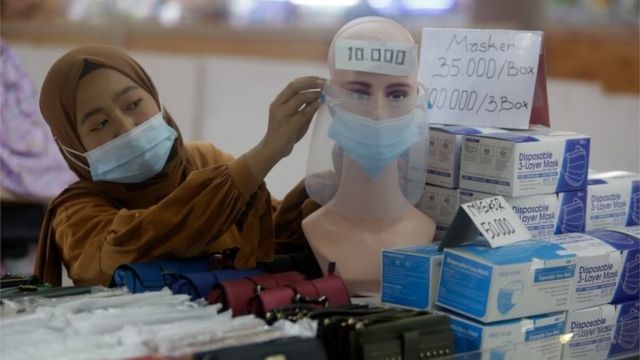
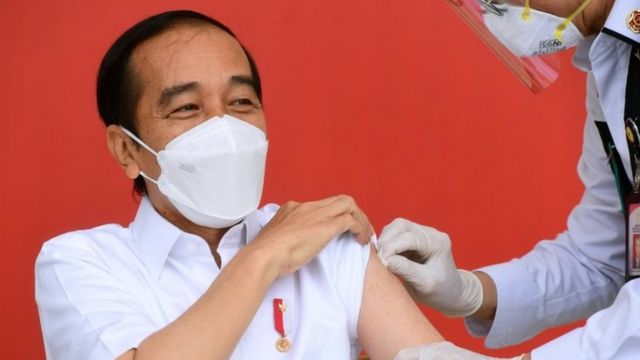
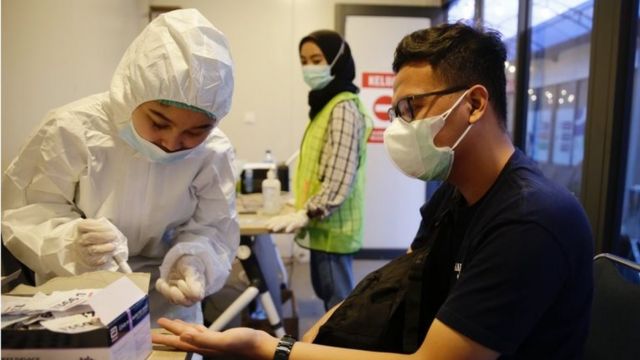
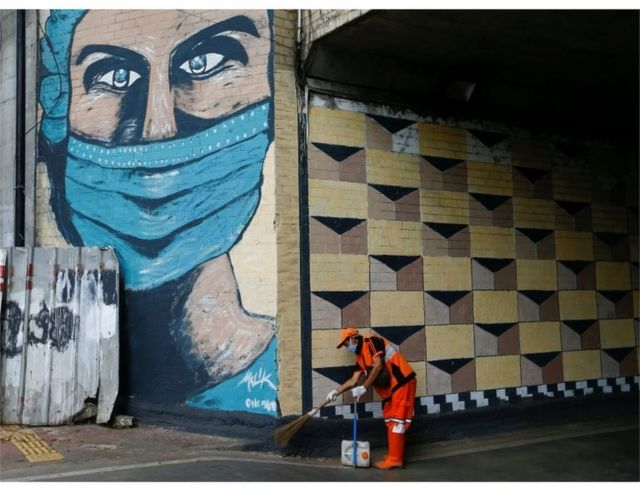
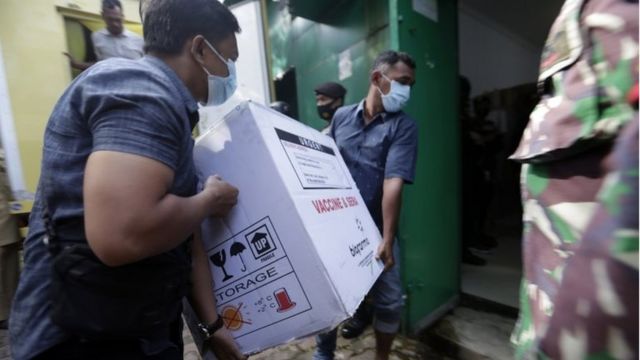

No comments:
Post a Comment